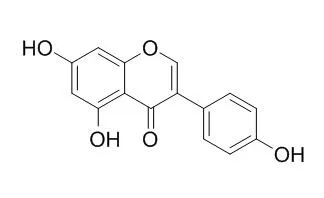| Description: |
Genistein, a phytoestrogen found in soy products, is a highly specific inhibitor of protein tyrosine kinase (PTK) which blocks the mitogenic effect mediated by EGF on NIH-3T3 cells with IC50 of 12μM or by insulin with IC50 of 19 μM. Genistein has neuroprotective, antitumor effects, it modulates the expression of NF-κB and MAPK (p-38 and ERK1/2), thereby attenuating d-Galactosamine induced fulminant hepatic failure in Wistar rats. |
| In vitro: |
| Mol Carcinog. 2015 Apr;54(4):301-11. | | Genistein inhibits hepatocellular carcinoma cell migration by reversing the epithelial-mesenchymal transition: partial mediation by the transcription factor NFAT1.[Pubmed: 24243709] | To investigate the effects and mechanism of Genistein on hepatocellular carcinoma.
METHODS AND RESULTS:
Cell counting kit-8 assays showed that Genistein at 3, 6, and 9 µM had no significant cytotoxic effects on HepG2, SMMC-7721, and Bel-7402 cells. Cell scratch and Transwell assays identified that Genistein inhibited migration of three cell lines. In three cell lines, Genistein enhanced E-cadherin and α-catenin, but reduced N-cadherin and Vimentin at both mRNA and protein levels in a dose-dependent manner. Simultaneously, treatment with Genistein suppressed epithelial-mesenchymal transition (EMT) induced by TGF-β. In HepG2 cells, Genistein reduced mRNA, and protein expressions of nuclear factor of activated T cells 1 (NFAT1), Abca3, Autotaxin, CD154, and Cox-2. Phorbol 12-myristate 13-acetate (PMA) and ionomycin enhanced activity of NFAT1, reduced E-cadherin and α-catenin protein levels, and increased protein levels of N-cadherin and Vimentin. Transwell demonstrated that PMA and ionomycin reversed the migration inhibitory effects of Genistein on HepG2 cells. In vivo, Genistein inhibited the intrahepatic metastasis by reversing the EMT, which was correlated with reduced NFAT1 . Genistein inhibited hepatocellular carcinoma cell migration by reversing the EMT, which was partly mediated by NFAT1.
CONCLUSIONS:
The fact that EMT can be reversed by Genistein may shed light on the possible mechanisms for its role in liver cancer therapy. | | Virus Res. 2014 Nov 4;192:114-20. | | Genistein inhibits the replication of avian leucosis virus subgroup J in DF-1 cells.[Pubmed: 25197039] | To investigate the antiviral effects of Genistein on the replication of avian leukosis virus subgroup J (ALV-J) in DF-1 cells, the cells were treated with Genistein at different time points and the antiviral effects were examined by using a variety of assays.
METHODS AND RESULTS:
We determined that Genistein strongly inhibited viral gene expression and decreased the viral protein level in the cell supernatant and the cytoplasm without alerting virus receptor expression and viral attachment. We also observed that Genistein was not found to interfere with virus entry, but significantly inhibited both viral gene transcriptions at 24h post infection and virus release, which indicate that Genistein exerts its inhibitory effects on the late phase of ALV-J replicative cycle.
CONCLUSIONS:
These results demonstrate that Genistein effectively block ALV-J replication by inhibiting virus transcription and release in DF-1 cells, which may be useful for therapeutic drug design. | | Anticancer Res. 2014 Sep;34(9):4685-92. | | Genistein potentiates the antitumor effect of 5-Fluorouracil by inducing apoptosis and autophagy in human pancreatic cancer cells.[Pubmed: 25202045] | Although 5-fluorouracil (5-FU)-based combination chemotherapy (i.e. FOLFIRINOX) has demonstrated effectiveness against pancreatic cancer, novel therapeutic strategies must be developed to increase the therapeutic window of these cytotoxic agents. Genistein is a soy-derived isoflavone with pleiotropic biological effects that can enhance the antitumor effect of chemotherapeutic agents.
METHODS AND RESULTS:
To understand how Genistein potentiates the antitumor effects of 5-FU, we examined apoptosis and autophagy in MIA PaCa-2 human pancreatic cancer cells and their derived xenografts. Apoptosis was evaluated using DNA fragmentation assays, and western blots of poly(ADP ribose)polymerase and caspase-3. Meanwhile, autophagy was evaluated using western blots of microtubule-associated protein light chain 3 (LC3)-I/II, fluorescent microscopy observation of green fluorescent protein-LC3B puncta formation, and acidic vesicular organelle formation using acridine orange staining. Tumors from animal treatment studies were examined for apoptosis and autophagy using the TdT-mediated dUTP nick-end labeling assay and immunohistochemical staining of LC3B, respectively.
We observed that Genistein increased 5-FU-induced cell death through increased apoptosis, as well as autophagy. The increased autophagy was accompanied by decreased B-cell lymphoma 2 (Bcl2) and increased beclin-1 protein levels. Animal treatment studies supported these observations. The combination of 5-FU and Genistein significantly reduced final xenograft tumor volume when compared to 5-FU-alone by inducing apoptosis as well as autophagy.
CONCLUSIONS:
Genistein can potentiate the antitumor effect of 5-FU by inducing apoptotic as well as autophagic cell death. These results demonstrate the potential of Genistein as an adjuvant therapeutic agent against pancreatic cancer. | | Neurobiol Dis. 2004 Jun;16(1):21-8. | | Neuroprotective effect of genistein against beta amyloid-induced neurotoxicity.[Pubmed: 15207258 ] | Estrogen is beneficial to patients with Alzheimer's disease (AD) but has a limited clinical use due to its proliferative and oncogenic effects on non-neuronal cells responsive to estrogen.
METHODS AND RESULTS:
In an attempt to find an estrogen substitute that retains the beneficial effects of estrogen with minimal side effects, we compared the neuroprotective and proliferative effects of Genistein, a selective estrogen receptor (ER) beta-agonist, with those of estrogen. Genistein and 17beta-estradiol showed comparable levels of protection against Abeta-induced deaths of cultured SH-SY5Y human neuroblastoma cells, which were blocked by an estrogen receptor antagonist, ICI 182,780. On the other hand, 17beta-estradiol, but not Genistein, induced proliferation of uterine endometrial cells.
CONCLUSIONS:
Our results suggest that Genistein is a potential alternative to estrogen in the treatment of Alzheimer's disease. |
|






 Cell. 2018 Jan 11;172(1-2):249-261.e12. doi: 10.1016/j.cell.2017.12.019.IF=36.216(2019)
Cell. 2018 Jan 11;172(1-2):249-261.e12. doi: 10.1016/j.cell.2017.12.019.IF=36.216(2019) Cell Metab. 2020 Mar 3;31(3):534-548.e5. doi: 10.1016/j.cmet.2020.01.002.IF=22.415(2019)
Cell Metab. 2020 Mar 3;31(3):534-548.e5. doi: 10.1016/j.cmet.2020.01.002.IF=22.415(2019) Mol Cell. 2017 Nov 16;68(4):673-685.e6. doi: 10.1016/j.molcel.2017.10.022.IF=14.548(2019)
Mol Cell. 2017 Nov 16;68(4):673-685.e6. doi: 10.1016/j.molcel.2017.10.022.IF=14.548(2019)